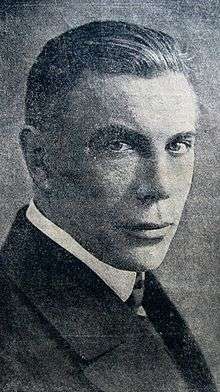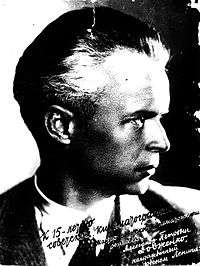All-Ukrainian Photo Cinema Administration
All-Ukrainian Photo Cinema Administration (Ukrainian: Всеукраїнське фото кіноуправління, translit. Vse-Ukrains'ke Foto Kino Upravlinnia, an acronym VUFKU (Ukrainian: ВУФКУ)) was a cinematographic state monopoly that united the entire film industry in Ukraine (1922–1930).[1] VUFKU was vertically integrated: it controlled production, distribution, and exhibition of films.[2]
VUFKU was established on 13 March 1922 under the National Commissar of Education of the Ukrainian SSR. A directive issued by the Commissar and the NKVD (Narodnyi komissariat vnutrennikh del) on 22 April 1922 transferred all movie theatres and all institutions and companies of photo and film industries located in Ukraine under the jurisdiction of VUFKU.[3]
VUFKU became the owner of a large studio in Odessa, and two small studios (called ateliers) in Kiev and Kharkiv. It also leased a studio from the Crimean Commissar of Education in Yalta. In 1929 the largest VUFKU film studio opened in Kiev. Four films were produced in 1923, 16 in 1924, 20 in 1927, 36 in 1928, and 31 in 1929. In these years the technical-manufacturing personnel of the studios increased from 47 in 1923 to 1,000 in 1929. The number of movie theaters grew just as rapidly, from 265 in 1914 to 5,394 in 1928.[4]
List of films
- 1926 The Trypillia Tragedy (Russian: Трипольская трагедия), directed by Alexander Anoschenko-Anoda (silent film)
- 1926 Love's Berries (Ukrainian: Ягідка кохання), directed by Alexander Dovzhenko (silent film)
- 1926 Taras Shevchenko (Ukrainian: Тарас Шевченко), directed by Pyotr Chardynin (silent film)
- 1927 The Diplomatic Pouch (Ukrainian: Сумка дипкур'єра), directed by Alexander Dovzhenko (silent film)
- 1928 Arsenal (Ukrainian: Арсенал), directed by Alexander Dovzhenko (silent film)
- 1928 Zvenyhora (Ukrainian: Звенигора), directed by Alexander Dovzhenko (silent film)
- 1928 Leather-man (Ukrainian: Шкурник), directed by Mykola Shpykovsky (silent film)
- 1929 Man with a Movie Camera (Ukrainian: Людина з кіноапаратом), directed by Dziga Vertov (documentary film)
- 1929 In Spring (Ukrainian: Навесні), directed by Mikhail Kaufman (documentary film)
- 1930 Earth (Ukrainian: Земля), directed by Alexander Dovzhenko (silent film)
Directors
References
- "УКРАЇНСЬКЕ НІМЕ / UKRAINIAN RE-VISION by Oleksandr Dovzhenko National Centre - issuu". issuu.com. Retrieved 2016-11-27.
- Nebesio, B.Y. (2009). "Competition from Ukraine: VUFKU and the Soviet Film Industry in the 1920s". Historical Journal of Film, Radio and Television. 29 (2): 159–80. doi:10.1080/01439680902890654.
- "Kinofest NYC - VUFKU History". kinofestnyc.com. Retrieved 2016-11-27.
- "Film". encyclopediaofukraine.com. Retrieved 2016-11-27.
Further reading
- Histoire du cinéma ukrainien (1896–1995), Lubomir Hosejko, Éditions à Dié, Dié, 2001, ISBN 978-2-908730-67-8, traduit en ukrainien en 2005 : Istoria Oukraïnskovo Kinemotografa, Kino-Kolo, Kiev, 2005, ISBN 966-8864-00-X
- Historical Dictionary of Ukraine, Ivan Katchanovski, Zenon E. Kohut, Bohdan Y. Nebesio, Myroslav Yurkevich, Scarecrow Press, 2013, ISBN 978-0-8108-7845-7
External links
- "Одесская Киностудия - Стартовая страница". odessafilm.com.ua. Archived from the original on 2016-11-19. Retrieved 2016-11-27.
- "Національний центр Олександра Довженка". dovzhenkocentre.org. Retrieved 2016-11-27.
- "Національний центр Олександра Довженка - Dovzhenko Centre | Facebook". facebook.com. Retrieved 2016-11-27.

